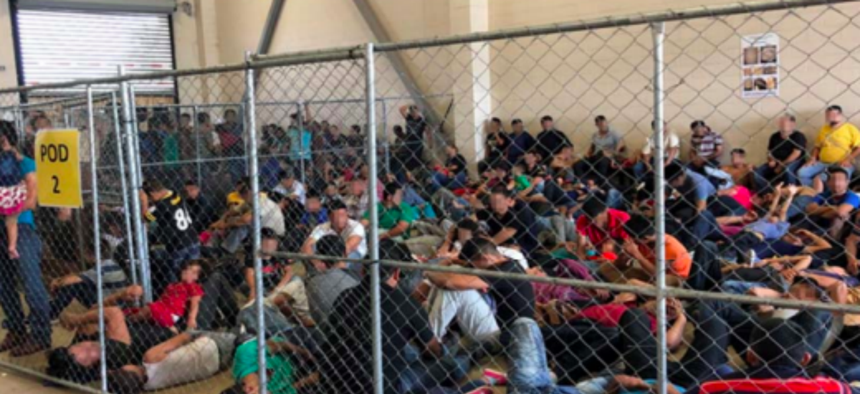IG Issues Alert for 'Dangerous' Conditions at Detention Facilities That Require 'Immediate Attention'
Migrants have been denied showers, hot food and forced into standing room only conditions for long periods of time.
The Homeland Security Department’s watchdog sounded the alarm on Tuesday over the Trump administration’s treatment of migrants and the conditions at the facilities in which they are detained, calling on management to address “dangerous overcrowding” and “prolonged detention” in violation of federal standards.
The Homeland Security inspector general issued a management alert to the department, citing a series of issues that “require immediate attention.” The IG found severely overcrowded facilities where some detainees were in standing room only conditions for a week, while others languished in cramped cells for a month or longer. The conditions posed health and safety risks to both detainees and department staff, the investigators said, with one senior manager calling the situation a “ticking time bomb.”
The situation at one facility was so tense the IG cut the visit short: "We ended our site visit at one Border Patrol facility early because our presence was agitating an already difficult situation. Specifically, when detainees observed us, they banged on the cell windows, shouted, pressed notes to the window with their time in custody, and gestured to evidence of their time in custody (e.g. beards)."
Nearly 43% of the detainees held in Border Patrol facilities in the Rio Grande Valley sector the IG visited remained in the agency’s custody for more than 72 hours, violating Homeland Security standards. Nearly one in five of the 8,000 migrants held by the Border Patrol were detained for more than 10 days.
Detainees are normally transferred to the custody of Immigration and Customs Enforcement or the Health and Human Services Department within three days, but those agencies reported their facilities are at capacity and therefore could not accept transfers from Customs and Border Protection. The administration has for months warned that an influx of migrants, especially families and unaccompanied children, has exhausted resources at Homeland Security and Health and Human Services, and have pushed government facilities to their breaking points. President Trump this week signed into law an emergency supplemental funding bill passed with bipartisan support to boost capacity at HHS and provide additional humanitarian aid.
Nearly one-third of children at the facilities were held longer than 72 hours, including 50 unaccompanied children under the age of seven who were held by the Border Patrol for more than one week. Children at three of the five facilities the IG visited had no access to showers, and limited access to a change of clothes, while two facilities did not provide the children with hot meals until the week the investigators arrived.
Most single adults in CBP custody had no access to showers despite some remaining in the facilities for a month. Those individuals received only bologna sandwiches to eat, which created digestive problems.
Homeland Security officials pointed to the significant uptick in migrants, calling the situation “an acute and worsening crisis.” The department noted it had added two tents that could hold 500 migrants each in the Rio Grande Valley and was working on setting up a third. DHS said it boosted medical resources and saved thousands of lives with emergency services.
The IG acknowledged the difficult circumstances under which the department is operating and commended it for the steps it had taken, but remained “concerned that DHS is not taking sufficient measures to address prolonged detention in CBP custody among single adults.”
Department officials said that absent further congressional action to reform immigration laws, the situation will “not only continue, but also escalate.”




